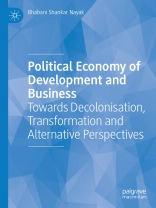This book presents an alternative, critical perspective on the political economy of development and business. The everyday issues experienced by those on the margins are examined to highlight the Eurocentric bias at the centre of development theory, public policy, and business practices. Ruling class projects within these areas are critically evaluated in order to present a vision of development that recognises pluralistic traditions and people’s everyday experiences. Eurocentric liberal myopia and its praxis are outlined in development theory, public policy, and business practices. Particular focus is given to tribal planning, needs based development, public private partnerships, modes of capital accumulation, conscious capitalism, and creative business education.
This book stands in defense of critical inquiry and pluriversal knowledge against the monolithic knowledge traditions and use of ruling class projects in development, public policy, and business ethics.It aims to explore new forms of economic transformation that are inclusive and worker led. It will be relevant to students and researchers interested in the political economy, development economics, and international business.
表中的内容
1. Colonial World of Postcolonial Historians and the Neoliberal Reinvention of Tribal Identity in India.- 2. Myth of Modernization and Development in Orissa.- 3. Interrogating Social Capital and Denials of Development in the Planning for Tribal Development in India.- 4. Capitalism and Transition of ‘Needs’ Based Development to ‘Desired’ based Development.- 5. Impossible Theorem and Possibilities of Development Studies.- 6. Reification and Praxis of Public Private Partnerships in History.- 7. Challenges of cultural relativism and the future of feminist universalism.- 8. Bhagavad Gita and Hindu Modes of Capitalist Accumulation in India.- 9. Bhagavad Gita in the making of conscious capitalism.- 10. Eurocentric conceptualisation of risk in international business.- 11. Decolonising business ethics from Eurocentric philosophy and advancing radical perspectives on pluriversal African business ethics.- 12. Subjective and Objective Limits of Creative Business Education.- 13. Post-pandemic transformations: How and why COVID-19 requires International Business to rethink its praxis.- 14. Follies of State and Capitalism during the Covid-19 Crisis.
关于作者
Prof. Bhabani Shankar Nayak is a political economist and works as Professor of Business Management and Programme Director of Strategic Business and Management at the University for the Creative Arts, UK. His research interests consist of closely interrelated and mutually guiding programmes surrounding political economy of religion, business, and capitalism, along with faith and globalisation, and economic policies. He is the author of Disenchanted India and Beyond: Musings on the Lockdown Alternatives (2020), China: The Bankable State (2021), Hindu Fundamentalism and the Spirit of Global Capitalism in India (2018) and Nationalising Crisis: The Political Economy of Public Policy in India (2007).












